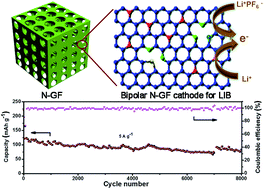Hierarchically porous nitrogen-doped graphene frameworks (N-GFs) are fabricated through the icetemplating of GO with polyethylenimine and the thermal treatment of the resultant hybrids. As cathode materials in lithium ion batteries (LIBs), the obtained N-GFs exhibit an outstanding specific capacity of 379 mA h g(-1) at 0.5 A g(-1) for 2500 cycles. Even at an ultrahigh current density of 5 A g(-1), the N-GFs maintain a capacity of 94 mA h g(-1), superior to that of most reported LIB cathode materials. The experimental results and quantum mechanics calculations suggest that pyridinic-like N and pyridinic N-oxide in graphene are responsible for the excellent cathodic performance of the bipolar N-GFs by providing fast surface faradaic reactions with both p-and n-doped states.

Hierarchically porous nitrogen-doped graphene frameworks (N-GFs) are fabricated through the icetemplating of GO with polyethylenimine and the thermal treatment of the resultant hybrids. As cathode materials in lithium ion batteries (LIBs), the obtained N-GFs exhibit an outstanding specific capacity of 379 mA h g(-1) at 0.5 A g(-1) for 2500 cycles. Even at an ultrahigh current density of 5 A g(-1), the N-GFs maintain a capacity of 94 mA h g(-1), superior to that of most reported LIB cathode materials. The experimental results and quantum mechanics calculations suggest that pyridinic-like N and pyridinic N-oxide in graphene are responsible for the excellent cathodic performance of the bipolar N-GFs by providing fast surface faradaic reactions with both p-and n-doped states.
